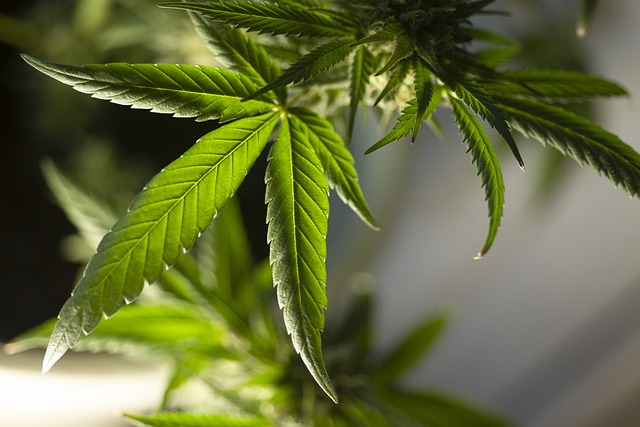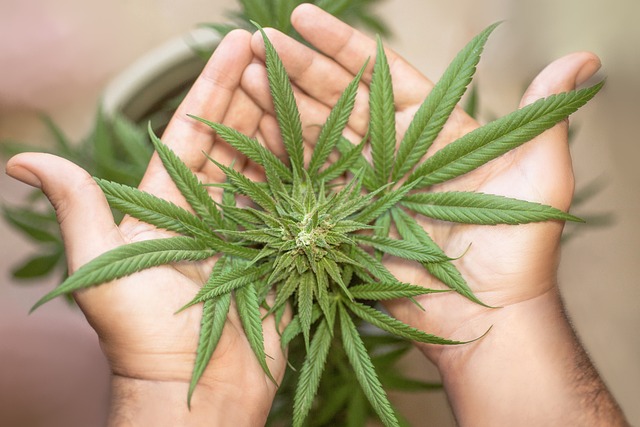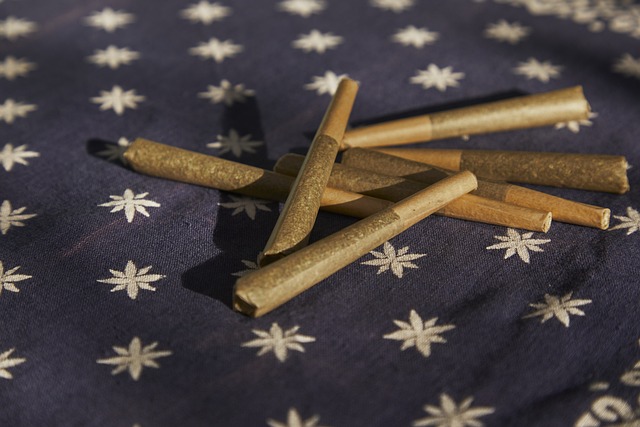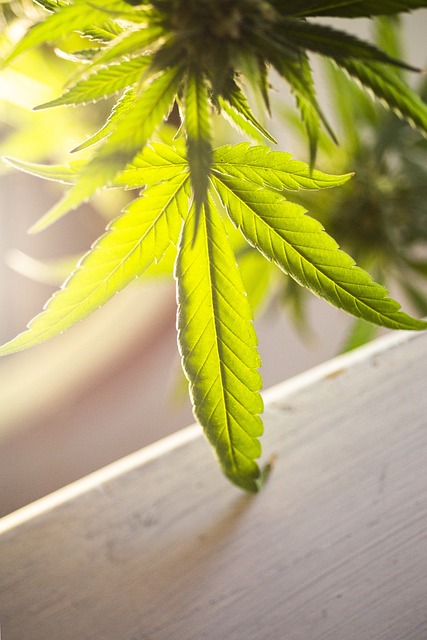
Δ9-tetrahydrocannabinolic acid (THCA) flower, a non-psychoactive compound found in cannabis, is gaining attention in the skincare industry for its potential therapeutic properties. Emerging research suggests that THCA flower engages with the endocannabinoid system to offer anti-inflammatory and antioxidant benefits suitable for various skin conditions including acne, eczema, and psoriasis. Its immune-modulating effects are particularly beneficial for soothing irritated skin and protecting against free radical damage. THCA flower is believed to maintain skin vitality, combat signs of aging, regulate sebum production, and inhibit the overgrowth of certain skin cells that can cause conditions like acne. The anti-inflammatory and antioxidant activities of THCA flower are advantageous for enhancing overall skin health. As a natural addition to skincare routines, THCA flower is being evaluated for its role in dermatological treatments. Individuals considering the inclusion of THCA flower in their skincare should consult with healthcare professionals to ensure it complements their existing regimen and to address any potential side effects or skin sensitivities. Always opt for reliable product sources for consistent quality and appropriate active compound concentrations.
Explore the burgeoning field where cannabis meets dermatology, focusing on THCA flower’s emergence in skin care regimens. This article delves into the science underpinning the therapeutic properties of THCA flower and its potential benefits for skin health. As we uncover how THCA flower can be integrated into skincare routines, safety and side effects become paramount considerations. Join us as we navigate this intriguing intersection and understand the implications of incorporating THCA flower into your beauty regimen.
- Unveiling the Potential of THCA Flower in Skin Care Regimens
- The Science Behind THCA Flower and Its Impact on Skin Health
- Exploring the Therapeutic Properties of THCA Flower for Skin Concerns
- Navigating Safety and Side Effects of THCA Flower Use in Skin Care Routines
Unveiling the Potential of THCA Flower in Skin Care Regimens

The therapeutic properties of THCA (Tetrahydrocannabinolic Acid), the raw form of THC (Tetrahydrocannabinol), have garnered attention in various health and wellness circles, including the realm of skin care. Emerging research suggests that THCA flower may hold promise for incorporation into skincare regimens due to its rich profile of cannabinoids and other beneficial compounds found within the hemp plant. Unlike its psychoactive counterpart THC, THCA is non-psychoactive, which makes it a compelling ingredient for those seeking the potential benefits without the psychotropic effects.
Applied topically, THCA flower extracts can interact with the body’s endocannabinoid system, potentially offering anti-inflammatory and soothing effects on the skin. This interaction may be particularly beneficial for conditions such as acne, eczema, and psoriasis, where inflammation plays a significant role. Additionally, THCA is believed to have antioxidant properties that could help protect skin cells from damage caused by free radicals, contributing to the maintenance of healthy skin and promoting a more youthful appearance. As an emerging player in skincare, THCA flower is a subject of growing interest among dermatologists and skincare enthusiasts alike, with ongoing studies aiming to further elucidate its effects and optimal usage within various formulations.
The Science Behind THCA Flower and Its Impact on Skin Health

Cannabidiolic acid (THCA), the non-psychoactive precursor to tetrahydrocannabinol (THC), has garnered attention in the realm of skin care due to its potential therapeutic properties. THCA flower, rich in this cannabinoid, interacts with the body’s endocannabinoid system, which plays a regulatory role in various physiological processes, including those affecting the skin. Studies suggest that THCA’s anti-inflammatory and antioxidant effects can contribute to maintaining skin health and preventing signs of aging. Its ability to modulate sebum production may also benefit individuals with oily skin conditions, as it could help in normalizing oil levels without causing dryness. Furthermore, the potential for THCA to inhibit the proliferation of certain skin cells might offer protective benefits against conditions like acne and psoriasis.
Incorporating THCA flower into skincare routines is being explored for its potential to promote healthy skin through topical applications. The anti-inflammatory properties are particularly noteworthy, as they may help soothe irritated skin and reduce redness, making it a promising ingredient for sensitive skin types. Additionally, THCA’s antioxidant capabilities could aid in protecting the skin against environmental stressors that contribute to damage and aging. While research is ongoing to fully elucidate the efficacy of THCA flower in skincare, its potential role as a natural complement to traditional treatments for various dermatological concerns warrants further investigation. Users interested in exploring the benefits of THCA flower for skin care should consult with a healthcare professional to ensure safe and effective use within their individual skincare regimen.
Exploring the Therapeutic Properties of THCA Flower for Skin Concerns

Delta-9-tetrahydrocannabinolic acid (THCA) is the non-psychoactive precursor to the well-known compound delta-9-tetrahydrocannabinol (THC) found in the cannabis plant. As research continues to unfold, THCA flower has garnered attention for its potential therapeutic benefits, particularly in the realm of skin care. Preliminary studies suggest that THCA’s interaction with the body’s endocannabinoid system may contribute to a host of skin-supportive properties, including anti-inflammatory and antioxidant effects. These properties could be beneficial for various skin concerns, such as redness, dryness, and signs of aging. The anti-inflammatory action is believed to stem from THCA’s ability to modulate immune responses, potentially offering relief for conditions like eczema or psoriasis. Additionally, the antioxidant potential of THCA flower may help protect skin cells against damage from free radicals, promoting a healthier and more radiant complexion. Users interested in incorporating THCA flower into their skincare routine often apply it topically, leveraging its rich cannabinoid content to target specific skin issues. As with any new skin care treatment, it’s advisable to introduce THCA flower gradually and follow guidance from a healthcare professional to ensure safe and effective use.
Navigating Safety and Side Effects of THCA Flower Use in Skin Care Routines

When incorporating THCA flower into skincare routines, it’s crucial to understand its safety profile and potential side effects. THCA, or tetrahydrocannabinolic acid, is a non-psychoactive compound found in the hemp plant that has been gaining attention for its therapeutic properties. Applied topically, THCA flower for skin care can offer various benefits due to its anti-inflammatory and antioxidant effects. It may help soothe irritated skin, reduce redness, and promote a healthy complexion. However, individuals with sensitive skin should proceed with caution as some may experience dryness or irritation upon initial application, which typically subsides with continued use. Moreover, those with a history of allergies to cannabis or related products should exercise caution, as there is a possibility of an adverse reaction. It’s advisable to perform a patch test before fully integrating THCA flower into your skincare regimen to ensure compatibility with your skin type. Additionally, while THCA flower for skin care may provide beneficial effects, it’s essential to use products from reputable sources, as the quality and concentration of active compounds can vary between brands. Consistency in application and following the manufacturer’s guidelines are key factors in achieving desired results without adverse side effects.
In wrapping up our exploration into the multifaceted potential of THCA flower for skin care, it’s clear that this cannabinoid holds promise for various dermatological applications. The scientific evidence suggests that incorporating THCA flower can offer therapeutic benefits and contribute to healthier skin. However, as with any skincare regimen, it’s crucial to consider the individual’s unique skin type and to approach THCA flower use judiciously, paying close attention to the product’s composition and dosage. Users should be aware of potential side effects and consult with a healthcare professional before integrating THCA flower into their skincare routine. By doing so, one can harness the benefits of THCA flower for skin care while minimizing risks.







